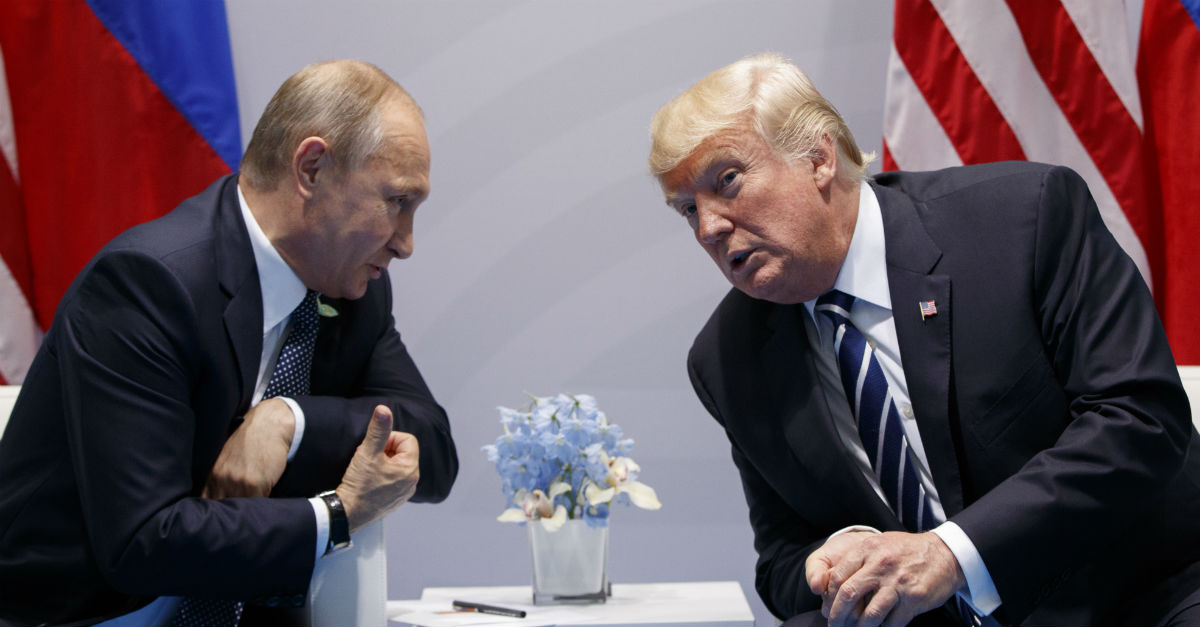After several days of dragging out deliberations on a Russia sanctions bill that had been sent to the president’s desk a week before, Donald Trump finally picked up his pen and scribbled his signature on the legislation. But he made it absolutely clear he wasn’t happy with the final outcome. If it were up to the White House, the bill — which passed with a huge amount of support in both the House and the Senate — would have been watered down to provide him with some breathing space to negotiate a deal with the Russians.
Videos by Rare
Unfortunately for Trump, we live in a federal republic with three co-equal branches of government. Congress passes laws, and the president can either approve or not approve them.
“[T]he bill remains seriously flawed,” Trump wrote in a press release accompanying his signature of the bill, “particularly because it encroaches on the executive branch’s authority to negotiate. Congress could not even negotiate a healthcare bill after seven years of talking.” That last point was a little comeuppance to members of his own party, who were unable to unite and push through even a mini-replacement for the Affordable Care Act. If Congress couldn’t even negotiate a health care bill, why on Earth would they stick their hands into an international negotiation that is the constitutional purview of the presidency?
RELATED: So far, Donald Trump has actually been tougher on Russia than Barack Obama
The answer to that question, of course, is easy to find. The Russia sanctions bill was everything that both political parties were hoping for. Republicans got an opportunity to act and sound tough on Moscow (and distinguish themselves from Trump), and Democrats got the chance to roll back the power of a president whom they see as enamored with Putin and perhaps in cahoots with him. In the end, the bill garnered enough bipartisan support that a veto would be fruitless, and the White House couldn’t do anything but swallow its pride and sign.
One cannot overstate how huge an obstacle this legislation will be for President Trump over the next three-and-a-half years, especially if he hasn’t quit on his desire to bring Washington’s relationship with Moscow out of the sewer. Indeed, the congressional review language included in the bill will make the entire executive branch’s Russia policy essentially hostage to congressional politics. If Russia bashing continues to be a fad on Capitol Hill, the Trump administration will be hard pressed to make any progress improving the bilateral relationship with Moscow, currently at its lowest point in a quarter century.
The Russians don’t give up anything for free, so if Washington expects Putin to pull Russian forces from Eastern Ukraine or stop supporting Ukrainian separatists militarily and financially, the U.S. better be prepared to provide some concessions in return. With this bill now the law of the land, however, the sanctions relief that would be most appetizing to Putin won’t be on the table unless Trump is able to move it through Congress first.
RELATED: Here are three things John Kelly needs to do to get Donald Trump’s White House in line
Like many Americans, I’m more than eager for the legislative branch to take some of its foreign policy power away from the executive. Over the last decade, members of Congress have been much too willing to defer to the White House, the State Department and the Pentagon on national security affairs – a prime example of this deference being America’s continued dependence on a 15-year-old authorization for the use of military force to fight terrorist groups around the world. But there is a big difference between taking back power from the president and blocking the president from doing what the Constitution has given him the power to do: engage in international diplomacy and negotiate deals that serve the best interests of Americans. At least on matters related to Russia, Trump is now on a short leash.
Under this legislation, pragmatic Russia policy is only as good as what U.S. politics allows at a particular moment. As if dealing with the Russians weren’t already tough enough.



